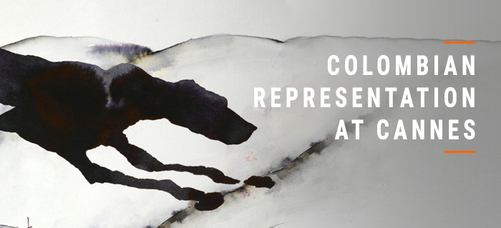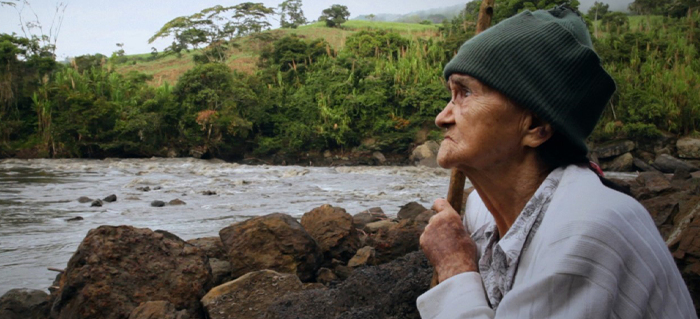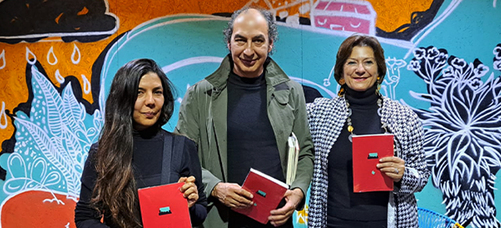
Colombia at Hot Docs and Visions du Réel
Pantalla Colombia No.: 122april 16 - may 31 / 2023
Four productions and four projects involving Colombian participation were showcased at these two renowned events dedicated to non-fiction cinema.

The Hot Docs Canadian International Documentary Film Festival, established in 1993, is North America's largest documentary film festival and holds significant importance in the audiovisual industry. The 2023 edition featured three Colombian productions.
Anhell69, directed by Theo Montoya and supported by the Film Development Fund - FDC in the Documentary Feature Filmmaking category, has been described by festival organizers as a groundbreaking transgender film "with no borders and no gender". It presents a radical approach to the documentary format, serving as a visual homage to a city transformed into a cemetery—a haunting portrayal of a gay ghost town nestled in the mountains, encapsulating the fears of a generation and a nation in ruins. This feature film, which received the French Film Critics Syndicate Award at the Festival Cinélatino Rencontres de Toulouse and other accolades, was showcased in the Nightvision section of the Canadian event.
Ana Bravo Pérez's film, Órganos internos de la madre tierra (Internal Organs of Mother Earth), co-produced by herself and Joram Kraaijeveld, depicts a critical and essential battle for the preservation of land in the Wayuu territory of northern Colombia. The film portrays the relentless and profit-driven mining companies that ravage the landscape, contrasted with the resilient individuals fighting to safeguard their ancestral lands. Prior to its participation in Hot Docs, this short film was selected for the Official Selection at the International Documentary Film Festival Amsterdam (IDFA) in 2022.
Emilce Quevedo Díaz's Nosotras (We, the Women) premiered in the Persister section. The film captures three generations of women in the director's family as they gather to care for their grandmother, Sixta, who resides in a remote village in the Colombian countryside and battles a terminal illness. Sixta's tenacity and endurance shine through her frail, aging body, reflecting a life marked by pain. The film reflects on family and the bonds among women, addressing traditional gender roles, sexism, domestic violence, and the influence of religion. Produced by Susana Urrea and Emilce Quevedo, edited by Ricardo Acosta, María Alejandra Briganti, and Carlos Cordero, and colorized by Manuela Paredes, this production received two incentives from the FDC: Documentary Filmmaking (2011) and Documentary Post-production (2019).
Meanwhile, the 54th edition of the Nyon International Film Festival Visions du Réel, renowned worldwide as a premier platform for non-fiction films and a vital gathering for film professionals, took place. The festival showcases numerous world and international premieres while serving as a creative hub for industry experts. One of the highlights of this edition was the world premiere of Samuel Moreno Álvarez's documentary Rodaje (Filming) in the Burning Lights Competition section. The film documents the six-week shooting of the feature film La roya (The Rust), directed by Juan Sebastián Mesa, in southwestern Antioquia, Colombia. The documentary intertwines the director's vision and the fictional script with the region's reality, capturing space interventions, equipment and machinery arrivals, the uncertainties of preparation, and transportation challenges.
Several projects involving Colombian filmmakers were featured within Visions du Réel's industry section, VdR, which provides crucial support for films at various production stages. Felipe Monroy's Simón el absurdo (Simon the absurd, a co-production between Switzerland, Colombia, France, and Mexico) participated in the VdR-Pitching section, while Manuel Muñoz's Fusil olímpico (a co-production between Honduras, Argentina, and Colombia) was part of VdR-Development Lab. Additionally, El silencio de la montaña by Inti Jacanamijoy, produced by Jorge Forero, and XiXi by Fan Wu (a Taiwanese production with Colombian Anna Magdalena Silva Schlenker as the editor) were part of VdR-Rough Cut Lab.
More news


